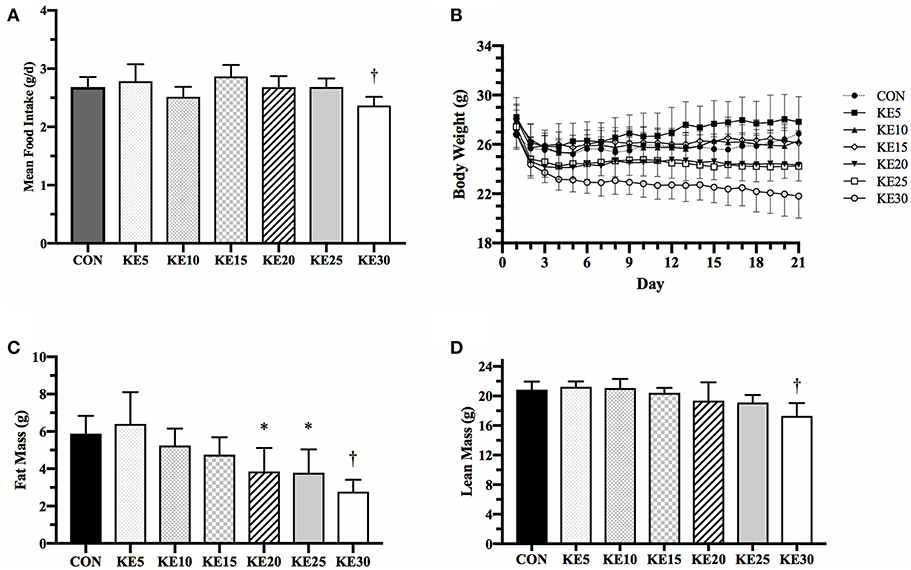
Image credit: Front. Nutr., 01 May 2019 | https://doi.org/10.3389/fnut.2019.00056
Previous research has shown the ketogenic diet to
· Decrease appetite
· Attenuate the reduction in energy expenditure that accompanies weight loss
· Produce thermogenic responses in brown adipose tissue
Due to these effects, there is a possibility that ketones are partially responsible for the weight loss effects of the ketogenic diet.
Our previous research demonstrated that mice fed exogenous ketones, in combination with standard rodent chow, reduced food intake and decreased body weight. In a recent publication that our team contributed to, it was investigated whether these supplements had a dose-dependent effect on body weight, body fat, energy intake, and energy expenditure.
How the study was designed
Animals were randomly assigned to one of seven groups of different ketone ester (KE) concentrations:
1. Control (0%)
2. KE5 (5% of calories from KE)
3. KE10 (10% of calories from KE)
4. KE15 (15% of calories from KE)
5. KE20 (20% of calories from KE)
6. KE25 (25% of calories from KE)
7. KE30 (30% of calories from KE)
Control diet: 63% carbohydrate, 17% fat, 20% protein (in order to create isocaloric diets for each group, calories from carbohydrates were replaced with the ketone ester)
Mice were maintained on their given diet for 3 weeks and were allowed to consume food and water ad libitum. Energy expenditure and body weight were recorded daily.
Parameters measured:
· Fat mass (FM)
· Lean body mass (LBM)
· Resting energy expenditure (REE)
· Total energy expenditure (TEE)
What we found
· All groups ate equal amounts of food to the control, with the exception of the KE30 group, which consumed 12% less than the control
· The KE25 and KE30 groups had significantly lower body weight than the control groups
· Fat mass and lean body mass were lower in the KE30 group compared to control
· Absolute resting energy expenditure and total energy expenditure were lower in both KE25 and KE30 mice compared to the control, however when adjusted for fat mass and lean body mass, both were lower only in the KE30 group
The results show that when mice consume 30% of their calories from exogenous ketones, they ate less, had lower body weight, lower fat mass, lower lean body mass, although they did show decreased energy expenditure.
However, when consuming 20% and 25% of calories from exogenous ketones, these animals consumed the same amount of food as control but had decreased body weight, fat mass, preserved their lean body mass, and showed no difference between energy expenditure.
Eating the same number of calories but losing weight goes against everything we have been taught on energy balance. It is possible that in the two groups that lost weight (despite eating the same amount of food) the energy from the ketones themselves was not effectively absorbed or metabolized. There may be other explanations to explain these results, but they are yet to be uncovered.
What can we take away from this?
This area of research is certainly in its early stages, and animal models can only suggest or hint at certain possibilities. With that said, these results indicate that ketones and the metabolic state of ketosis could very well be aiding in weight loss beyond the appetite suppression and decreased food intake that typically accompanies this style of eating. Not only that, but choosing a weight loss strategy that can preserve your metabolic rate and lean body mass makes this a very appealing protocol, and it may not even involve the carbohydrate restriction of a ketogenic diet.
Written by: Kristi Storoschuk; Edited by: Dr. Dominic DAgostino
